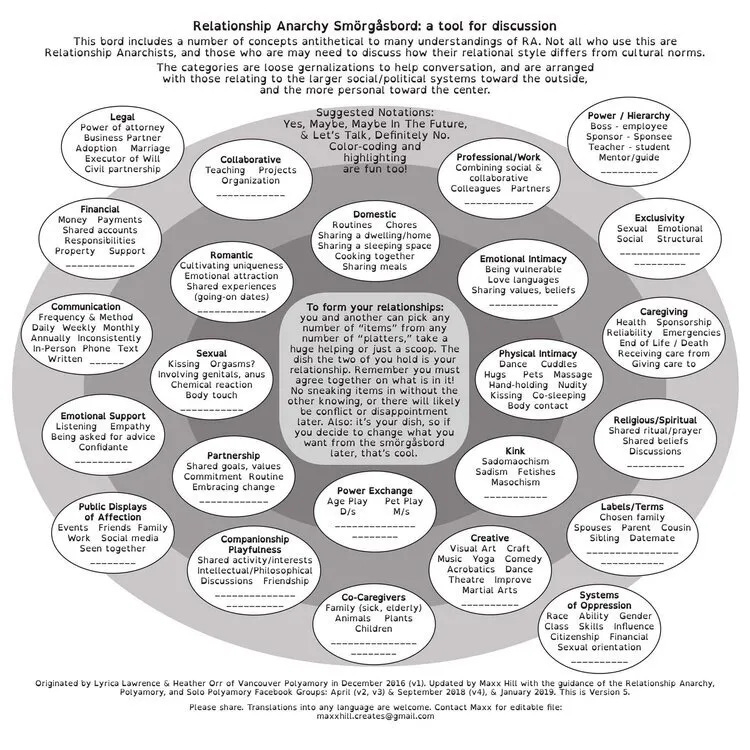I feel like boundaries and communication are a really hot topic right now. I hear sentences like “I need to get better at asserting my boundaries.”, or “This person has very well-communicated, but rigid, boundaries.” being passed around on a daily basis. It’s a pretty universally acknowledged truth that communication is the cornerstone of good relationships, but have our social media feeds always been so stuffed with cute little infographics on how to perfectly polish our communication skills, into crystal-clarity? And of course, any potential virtue signal is quickly weaponized, which this meme demonstrates perfectly:
 Tiktok failed to load.
Tiktok failed to load.Enable 3rd party cookies or use another browser
I want to explore the idea that, while communication of wants and boundaries is healthy, it’s not the same as spelling out the letter of the law, and using “boundaries therapy language” is not a magic spell that makes whatever you say good communication. I urge you instead to focus on the “spirit” of whatever you or your partner wish to express. I believe this approach is underused in my world.
First, I should probably clarify that “my world” is a pretty wacky place. I have been living, community-building, and dating in San Francisco/Berkeley for about 10 years. My friends and partners have been a range of types of people, many of them definitive weirdos. There’s burner hippy types, silicon valley tech idealists, new agey-dance queer counter-culturals, kids that grew up in SF, immigrants and global citizens, awkward scientists, psychedelic enthusiasts, and people like me that fled “backwater” conservative places in the US. This combination of different cultural backgrounds (and cultural rejections) means that in my daily life and interpersonal relations, there aren’t rock-solid cultural norms backing up our interactions. “Are you polyamorous? In what way? Are you into kink?” are all pretty standard first-date questions. But it’s not just dating. People greet each other with hugs at parties. Large cuddle piles of friends in their 30s and 40s are pretty normal. Most people care a lot about consideration and consent in these subcultures (thankfully), but neurodivergence, cultural diversity, and drug use puts a high burden on strong interpersonal communication. If we weren’t communicating well in this environment, nobody would know what to expect from anybody!
I started thinking about all of this when my good friend Davey demonstrated communication of a “spiritual boundary” perfectly to me. A group of friends, roommates, and I were all at a festival-like event, a little cold in our costumes, and huddling together while waiting in line for an art experience. Davey was in the process of clarifying how much, if at all, he could cuddle with me while we waited, a prospect I was pretty happy about: “Hey, so where is touching you ok?”. I think I said something slightly awkward like “uhhhh…like wherever really, as long as it’s normal”. Him: “Oh, so just any non-sexual touch, you mean. Great.”. Me: “Exactly!”. His girlfriend Karen (also in the cuddle pile) and I then started excitedly chatting about how we wouldn’t have thought to answer the question in this way. She and I are both socially-awkward trained scientists. We are used to describing things technically, so it was a slight revelation. Him: “Well yea, depending on the context, I could touch you non-sexually on the dick, or sexually on the elbow.”. Challenge left as an exercise to the reader. The key insight is:
If I’m talking to someone that I trust enough, I can use their internal experience and intentions as building blocks in the communication of my boundary.
I hope what I’m talking about is starting to become clear. When I say “spiritual”, I don’t mean some kind of “energetic” sense that my most hippy-leaning friends are into (though, to said friends: it could definitely include that stuff). I really just mean “spirit” as in “spirit of the law, not the letter”. Communicating this way is incredibly powerful, especially when discussing the boundaries and needs of a romantic partnership. But before getting ahead of myself, I also want to clarify “boundary” a little. You’ve all set boundaries before. It can be as simple as “I don’t want to talk about this anymore.”. Some literature makes the distinction between “boundaries”: “don’t infringe on my autonomy in this way”, “rules”: “moderate your behavior in this way”, or more generally, “wants”. I think this distinction is fairly pedantic, and for the sake of this discussion, I’m going to refer to them all pretty interchangeably. At the end of the day, your partner will want things from you (and visa versa), and you’ll have to negotiate granting those things or not. I don’t see this as a principled process with clear ideas of right and wrong, it’s just a conversation to find a place where both people can be happy, or divorce trying.
So how do we apply it? Discussion of the boundaries and rules of a relationship has become ever more pressing in my life. I’m not in Utah anymore, and monogamy is far from an assumed cultural default. If anything, strict, normative, monogamy is fairly rare and edgy here. I’ve dated under a variety of relationship styles, and while I tend towards monogamy (I’d rather spend my free time surfing tyvm), any preferences I have are very context-dependent, so heavy discussion is a must. Similarly, angst, negotiation, and miscommunication over the exact boundaries of a romantic partnership is one of the most common support topics my friends come to me with, and easily the biggest source of drama. The RA Smorgasbord is a popular recommendation, but I’ve found the idea of it to be more useful than the actual form.
What makes a boundary “spiritual, and how is it different from a “material” one? Always start with examples. Here are some common material boundaries/wants for romantic partnerships of various styles:
I don’t want you to have sex with other people. (a classic)
I want you to text me good night every night.
Please don’t text me after 10.
I’m not comfortable with you being naked around your <insert gender> friends.
I don’t want you spending more time with your other partner than me.
I don’t want you to contact my family unless it’s an emergency.
I don’t want us to spend more than 3 nights a week together.
I don’t want you to discuss our relationship problems with <X>.
I want to go to sleep next to you every night at this festival.
I’m not ok with you going on a solo trip with your ex.
I don’t want to have to hang out with you and my metamour together.
Think what you will about the health of these boundaries. Depending on who you are, different examples will seem unhealthily restrictive, obviously taken for granted, or a normal discussion point in your relationship. Personally, I wouldn’t judge for anything aside from dishonesty, lack of transparency, or failure to meet your commitments. But what all of the above wants/boundaries have in common is that they are expressed materially. They are about concrete behaviors that could be observed and measured from the outside. This is good because they are clear. But the problem is that they aren’t very accurate: at the end of the day, they probably aren’t what you really want. Have any of you ever been in a relationship with mandated good night texts where as soon as they were agreed upon, they started to feel empty and hollow? Or check out this TikTok meme.
 Tiktok failed to load.
Tiktok failed to load.Enable 3rd party cookies or use another browser
“Buy me flowers” is a totally unambiguous material want, and we could just ask for flowers. It just doesn’t feel good, even if it’s happily agreed to.
So, there are pros and cons. Let’s contrast those material boundaries with these examples of spiritual boundaries:
I’m not ok with you flirting with strangers.
I don’t want to feel bound to you at this event.
I’m not ok with you exchanging erotic energy with your best friend.
You have to tell me if you don’t see a future with me anymore, ok?
Don’t speak to me violently.
Please keep the intimate details of our relationship private.
I’m ok with you dating other people as long as they never become backup life partners.
It’s important to me that I am always welcome in your presence at this event.
No emotional cheating.
I don’t want you to think you have a right to my erotic expression.
Again, I’m not here to tell you if these examples are the right boundaries/wants for your relationship, and definitely not whether they are “reasonable”, if such a thing exists. I can’t imagine a single relationship where the full set of them is right. The point is that in the second list, all of the boundaries/wants are highly-contextual, are based on internal states and emotions, and might be invisible to a third-party observer. Look at “don’t speak to me violently”. What is violent speech, and who’s to say? There are whole books about Non-Violent Communication. They talk about how to use “I” statements and not put words in your partner’s mouth and such. Those practices aren’t bad, but there’s a reason “weaponized nonviolent communication” is a meme.
So instead of giving an objective definition, I’m going to assert that if you’ve been on this Earth for very long at all, you know what violence is. Violence is the intent to hurt unnecessarily…and you can feel it. Nothing more, nothing less. That’s not to say it’s easy to be nonviolent. People lash out when they are hurt or scared. You might not cognitively want to hurt your partner, but some part of you snaps and says something you know will hit a trigger of theirs. This is very human, but it is violence, and if your partner is in touch with themselves and you, they’ll notice. It doesn’t matter if the claim to violence would hold up in court. (none of these boundaries would — they’re immaterial) It doesn’t matter if you’re following Non-Violent Communication Practices™. It matters that you both felt the blow.
Of course, you can’t use spiritual boundaries with just anyone, especially in low-context cultures like California. They depend more heavily on mutual trust and shared understanding than their material counterparts. It’s obvious who you slept next to, but erotic energy can be invisible to everyone but the two people involved. Of course, you don’t want to be dating (or ideally even talking with) someone you don’t trust. But it’s not even that simple. There are different levels of trust and different kinds of trust that can be required, for each type of expression. Here’s another important thing to accept: unless you’re some kind of enlightened zen master, you don’t trust your partner, or yourself, completely in every way. If you trusted your partner (and yourself) 100%, you wouldn’t need any boundaries at all. You could just say “hey, don’t hurt me please”, and sit tranquil, in the security that no harm would ever come to you as a consequence of your partner’s actions. You wouldn’t even need to say it, because you trust your partner’s benevolence. Boundaries are for the places that you don’t quite trust your partner. Or yourself. Or the universe. “Don’t hurt me”, while simple to express as a boundary, is extremely relationally advanced.
So let’s take a look at an entry-level, but still spiritually-expressed, boundary. The one at the top of the list, a monogamous classic, but it could easily appear in poly situations as well. Theoretically, I might ask my (wonderful) partner: “I’d like it if you don’t flirt with other people while we’re at this party together.” If Elise1 accepts, I can trust it completely, even though flirting is fuzzy, and intention-based, and subjective. This is because of the specific set of trusts we’ve built together. I trust her intuition and sensitivity, to know what flirting is, and to notice if someone is flirting with her. I trust her self-awareness and self-control, to be able to observe how she feels about the situation, know how she is responding, and respond in a way that respects the boundary. I trust her intention, to care about upholding my boundary because she cares about me, and probably empathizes with whatever the reasons are. It’s so easy to trust her honesty. (I described her to a friend as “dripping with integrity” after our first date.) I trust that she’d tell me if there was a mistake, and that her respect of the boundary is not contingent on me paying any attention to it, or even being in the room. And in fact, I probably trust all these things more than my observation of interactions from the outside. Flirting is between two people, not third-party observers. It’s fundamentally harder for me to tell if my partner is flirting with someone than for her to tell, and I don’t want monitoring adherence to be my job anyway; that would feel gross and anxiety-inducing.
I just said that if trust were absolute, there’d be no need for a boundary at all, and I stand by this. But I’m not saying trust should be absolute. Trusting is hard, and maybe it’s not even warranted. Every boundary marks the edges of your trust, trying to seal your mistrusts on its outside, while holding your trusts inside. Where are the mistrusts in the above example? Why is the boundary even necessary? Maybe I don’t trust my partner’s commitment, but that’s not necessarily it. Maybe I don’t trust my own social confidence, and the situation sounds awkward and unpleasant at a time I want to be relaxedly enjoying together with my partner. Perhaps at some level I don’t trust the world, that flirting wouldn’t turn into something more threatening to my relational security, despite everyone’s best intentions. Perhaps more trusts could transform the situation to make the boundary unnecessary. What if I trusted the durability of her commitment to me beyond a doubt? If I trusted her discernment to choose friendly, pleasant people to flirt with, and push them away if they were rude to me? If I trusted the world more, to be full of friendly, pleasant, well-meaning strangers? If I trusted myself to feel nonreactive and unthreatened, or even amused? Then the boundary could dissolve and expand to a further-out perhaps less-specific spiritual boundary.
Ok, flirting is pretty straightforward. Let’s get to a more advanced partnership negotiation. How about something like “I can feel secure with you going on dates with person Y, so long as you promise me you can prevent yourself from becoming partner-attached to them.”. (As a side note, this “boundary” is stated non-coercively, and without moral judgment. Instead, it’s a statement of emotional cause and effect. I think that’s a pretty cool communicative feature, but it’s probably a topic for a different essay.) Let’s focus on the sorts of trust it would take, to feel secure in your partner’s acceptance of this hypothetical spiritual boundary. First, it requires trust in a shared understanding of what partner-attached means. To me, this phrase points to a distinct human emotional and biological dynamic that is often in concert with, but fundamentally distinct from emotional intimacy, romance, friendship, and eroticism. Those words may mean something different to you, reader, but that doesn’t matter, because I’m not dating you! Like abstention from flirting, upholding this boundary requires trustworthy sensitivity, attunement, intention, and honesty. Unlike flirting, it implies a commitment over a significantly longer timescale, as well as deep self-knowledge and powerful self-determination. These are of course hard things to trust from ourselves, let alone another. Maybe our trustworthiness is ultimately bounded by our own self-knowledge. “Know thyself” was written on a temple for a reason.
So, am I saying spiritual boundaries are just better? Despite the imperative title of this essay, I don’t think we should always jump to spiritual boundaries in every relationship or situation. But I do think they are aspirational, for each of our relationships, romantic and not, over time. When I just meet someone, maybe the best I can do with our limited shared understanding and trust is give them simple material boundaries. “I don’t wanna kiss on the first date” (gender dynamics aside) is crystal clear, and only requires trust in the listener’s basic human respect. But just as building trust and context with an Other moves the boundaries, it also allows for refinement of their communication. Maybe the process of loving someone is growing that shared understanding, to be able to express exactly what you want with spiritual precision.
When we first meet, “Kiss me on the cheek”.
At one month, “Kiss me gently and slowly”.
Later, “Kiss me like you mean it.”
After seasons together, “Kiss me like the last dead leaf falling.”
Now, finally, you can get it exactly right.
Thanks for reading my weird rant about relationships! Thanks to my friends Connor Wilson, Miles Bennett, and Yann Zhu for their feedback on these ideas, and Karen Castelleti and Davey Alvarez for being in this story. And thanks to my love, Elise Liu, for both of the above, some writing advice, and continually showing up to grow with me. ❤
This repost is about two years after the original, and I am no longer dating Elise, who is mentioned in this essay twice. We’re still friends and still respect each other though, so maybe not everything in this essay was wrong.





